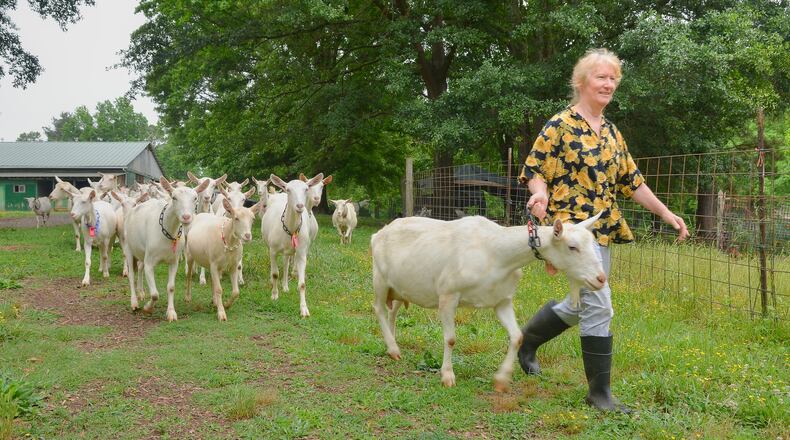Mary Rigdon never sleeps late — not even on weekends. She doesn’t go carousing past 7 p.m. either. Some folks might not take to rising at 4 a.m. on a Saturday or being stuck at home in the evenings, but this dairy goat farmer doesn’t mind.
“It’s not so much a job as a lifestyle,” Rigdon said of tending to a herd of Saanen dairy goats, milking them twice a day and processing that into cheese.
It’s a lifestyle that Rigdon adopted when she began tending to her first two dairy goats in 1995. That was part of a larger plan that included moving to the country, with the goal of being a stay-at-home mother to her 2-year-old daughter. She figured she could spend her free time in the kitchen making cheese for her family, perhaps even turn it into a business.
Decimal Place Farm has done a lot of growing in the 26 years that Rigdon and her husband Ed have owned their Clayton County property, about a 20-minute drive southeast of downtown Atlanta. While the farm’s name is a nod to its small size (as well as Ed’s profession as a mathematician who teaches marketing classes at Georgia State University), it has expanded from an initial 12 acres to 40.
In 2008, she turned it into a business, complete with a milk parlor (until then, she had been hand-milking) and dairy room. She began selling her artisanal cheese at farmers markets, and later to a few specialty food stores, as well as to Atlanta restaurants committed to sourcing from local farms, including Miller Union, Wrecking Bar, the Deer and the Dove, Bellina Alimentari and Farm Burger. Her cheese has been served at the Governor’s Mansion and the James Beard House in New York. In her lifetime, even famed Southern chef Edna Lewis nibbled on Rigdon’s cheese.
The New Jersey native moved to Georgia decades ago to earn a degree in animal science from the University of Georgia. Now, Rigdon serves as a model for small-scale goat husbandry and artisanal cheesemaking.
A day at Decimal Place
As Rigdon and I walked the muddy path leading to the barn and an adjacent small building used for milking, processing and cheesemaking, a dozen or so goats on the other side of the fence munched quietly on clumps of green grass.
The first order of the day was to milk the goats. A dozen does waited on the ramp outside the milk parlor. Rigdon and her assistant, Julie Casil, opened the door and the goats hurriedly filed in. Each one approached a stanchion, put her head inside, and began to contentedly munch on the bucket of food on the opposite side that held a mix of oats and corn sweetened with molasses (and a bonus scoop of black oil sunflower seeds and whey protein for the animals that needed a protein boost).
Credit: Chris Hunt
Credit: Chris Hunt
The headgates came down, restraining the goats. Rigdon and Casil got to work disinfecting their teats and attaching them to pairs of mechanical suction pumps. It would take about five minutes to extract the half-gallon or so of ivory milk from each doe before unhooking them, leading the goats out the back door to pasture and herding in the next crew.
The Decimal Place herd currently includes 50 adult females, but the number is in constant flux. Add to that a group of 21 kids that she playfully refers to as “teenagers,” plus a couple of sires for breeding. Rigdon manages a closed herd, which means breeding is within the herd; all of her goats are born and raised on the farm, not purchased from elsewhere and brought into the herd.
Credit: Ligaya Figueras
Credit: Ligaya Figueras
Rigdon breeds year-round, which means there are always pregnant does and, with an average 5-month gestation, births are frequent. The day I visited, I fawned over 2-day-old kids at the side of their mother, Fern. Another expectant mother was in the early stages of labor; Rigdon expected her kids to arrive by nightfall. Yet another goat was in a different barn stall. So heavily pregnant was she — Rigdon guessed she could be carrying a rare litter of four — that the goat rested legs, belly and all on the thick bed of straw.
A number hangs around the neck of each Decimal Place goat, but Rigdon knows them all by name. There’s Solstice, Jenny, Ida and Keisha. Joy Dior and Lady Elaine Fairchild, one of the herd’s current leaders. And a very boisterous little guy named Sammy.
“Mary is amazing,” said Casil, who has assisted Rigdon with the milking for the past two years. Casil even moved close to Decimal Place to learn the ins and outs of goat farming, and hopes to start raising her own come fall.
With the milking done, Rigdon went outside and whistled. It was time to move to another pasture to prevent overgrazing.
“Come on, everybody. Let’s go!” she shouted as she opened the gate.
She was met with a chorus of “baas.” They filed out in twos and threes, flanked by a pair of Great Pyrenees guard dogs.
“Mary is basically their mother,” said operations manager Brett O’Shea, who took up the rear as Rigdon led the goats down a path and across a stream to a hilly section that offered large rocks for climbing and bark-filled trees for chomping (although little Sammy found my cargo pants to be far tastier).
A different kind of place
A goat can live up to 16 years, but “it depends on how they are cared for,” Rigdon said. “I got into this to take good care of them.”
Some 70% of their diet comes from grazing on the organically maintained fields. And they are not injected with hormones or antibiotics.
She is diligent about keeping the herd free of diseases like caprine arthritis encephalitis, or CAE, a debilitating virus, as well as scrapie, a fatal brain disease.
And there’s a reason why she chose Saanen goats over other breeds such as Nubians, with their long, floppy ears, or Nigerian Dwarfs, known for the high butterfat content but low production. Saanen, with origins in Switzerland and arrival to the U.S. in 1901, has a gentle, peaceful demeanor compatible with Rigdon’s own.
Like the goats, Decimal Place cheese is also unique. After being pasteurized in 15-gallon batches, the milk is turned into feta, chevre, cheddar, mozzarella, and a creamy cheese ripe for whipping into a fluffy cloud to dollop or spread atop everything from roasted beets to tea breads.
Credit: Chris Hunt
Credit: Chris Hunt
The cheese is free of preservatives and dyes and is made with little to no sodium, an attraction among Rigdon’s customers with digestive problems, allergies and hypertension. What’s more, it is uber fresh, going from udder to customer in two days.
Rigdon could expand her farm, but she’s satisfied with the synergy and symbiosis that come from the small size of her operation. It’s one that enables her to make just enough milk to supply the area demand for cheese, to give the whey to a local pig farmer and to employ folks like O’Shea, the operations manager, and assistant cheesemaker Danielle Cuff, her “COVID rescues” who needed a job because their restaurant livelihoods were upended due to the pandemic.
Credit: Becky Stein
Credit: Becky Stein
Rigdon encourages consumers to check out cheesemakers in their own vicinity.
Before I could get into my car, she offered parting words about the Decimal Place philosophy: “Living simply so others can simply live. That’s the idea.”
For more information about Decimal Place Farm, visit decimalplacefarm.com, or you can find Rigdon on Saturday mornings at the Freedom Farmers Market.
About the Author
The Latest
Featured







